Coronavirus alert in Birmingham as medics in hazmat suits quarantine suspected victim after he was SENT HOME by GP – despite revealing he had just returned from Wuhan
- Drew Bennett, 39, travelled home from Wuhan to Birmingham on December 31 after holidaying in Chinese city
- Struck down with severe flu-like symptoms but was told not to worry and to go home by his doctor on Monday
- Yesterday ambulance carrying medic in hazmat suit was sent to take him to hospital, isolate him and run tests
- But paramedics spotted without any protective gear, sparking fears UK officials not taking outbreak seriously
- Do YOU have a story about the deadly coronavirus? Email connor.boyd@mailonline.co.uk
This is the moment a suspected British coronavirus patient who had returned from Wuhan was loaded into an ambulance by a hazmat-clad paramedic – hours after being sent home by his GP.
Drew Bennett, 39, is feared to have contracted the potentially deadly virus during a recent holiday to the Chinese city at the heart of the outbreak and is currently in isolation at a Birmingham hospital.
The sales worker returned from Wuhan on New Years’ Eve and quickly developed flu-like symptoms before becoming too unwell to leave his bed.
But he revealed today that when he visited his GP on Monday he was told to go home – despite fears the highly contagious virus is poised to claim its first British victim.
The advice given by his doctor contradicted health bosses’ warning that suspected coronavirus patients must be ‘locked in a room alone straight away’.
Guidance issued to GPs by Public Health England last week ordered them to put patients in a separate room, close the door and ‘don’t let them touch anything or anyone’.
At 4.20pm on Monday an ambulance carrying medics in hazmat suits was sent to Mr Bennett’s address in Harborne, Birmingham. He was rushed to the Queen Elizabeth Hospital to have blood tests, where he remains in isolation awaiting results.
Video captured by a neighbour showed one medic wearing a white hazmat suit, blue apron, gloves and a mask with a visor, escorting him into the ambulance.
But two West Midlands Ambulance Service crew could be seen without any protective clothing or masks – sparking fears British authorities are failing to take the threat of spreading the killer disease seriously.
In other developments:
- At least 4,500 people have been struck down with the killer virus across the world as China has now recorded 106 deaths in the ever-worsening outbreak
- Britons stuck in coronavirus-hit Wuhan are gearing up to be flown back to the UK on Thursday via chartered planes in a landmark evacuation mission
- The Department of Health today confirmed almost 100 people have now been tested for the deadly coronavirus in the UK – but all of them have come back as negative
- A German man infected with the Wuhan coronavirus has become the first European to catch the deadly illness outside of China
- A British-American dual national was evacuated out of Wuhan on a California-bound chartered plane organised by US officials
- The British expert developing a vaccine against coronavirus says it has a ‘very good chance’ of being effective as he claims trials will start mid-February
- A British citizen isolated in Wuhan has said he is too afraid to leave his flat for fear of infecting his nine-month-old daughter with the deadly coronavirus
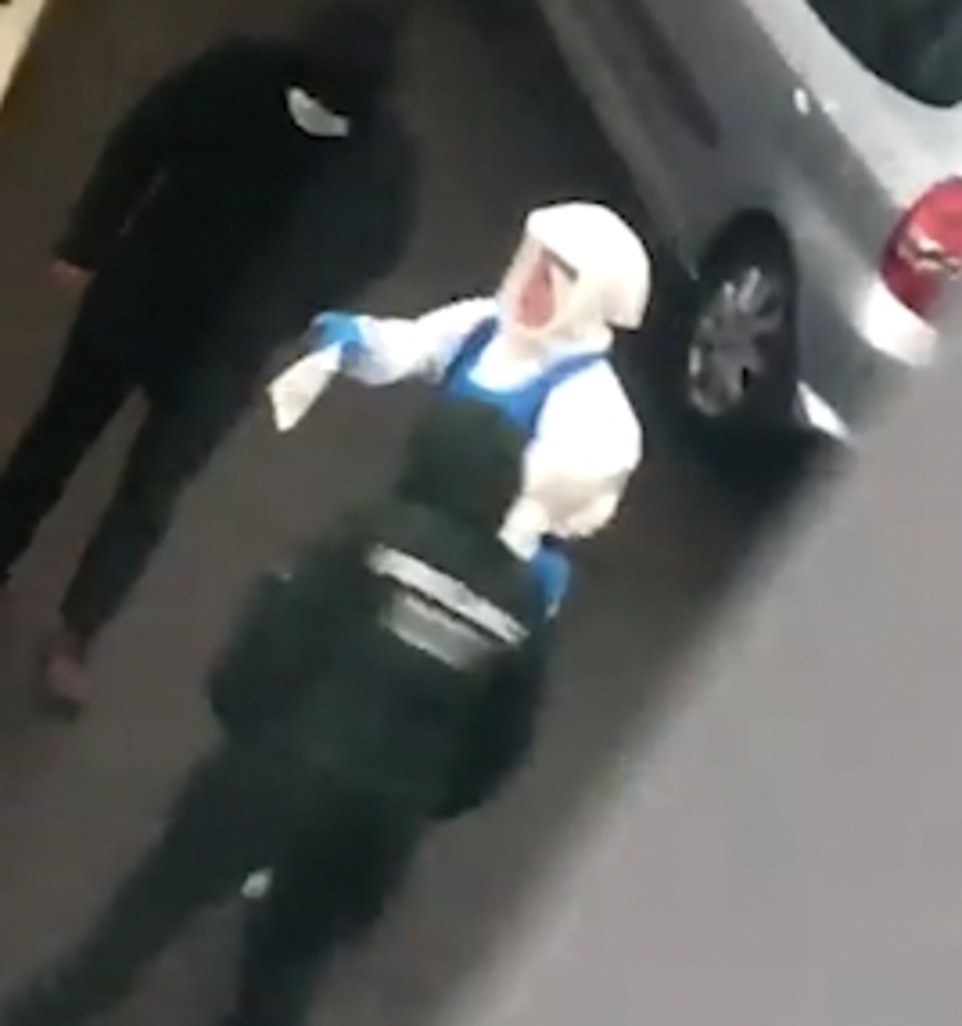
A paramedic head-to-toe in protective gear directs Drew Bennett, 39, into an ambulance on a residential street in Harborne, Birmingham
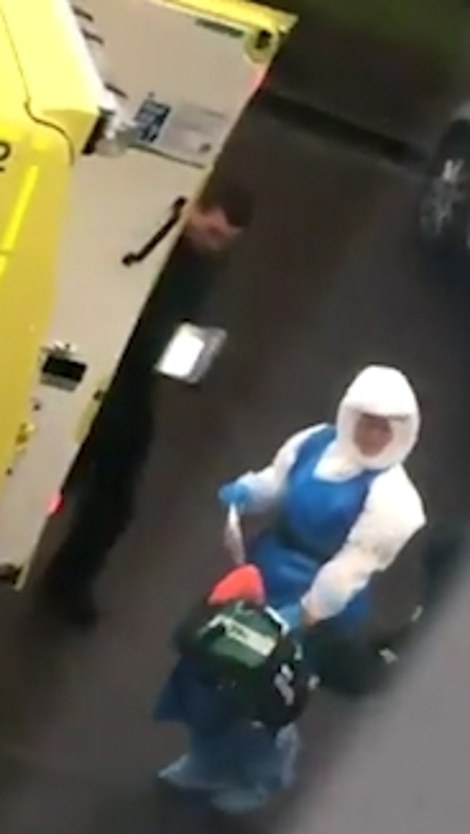
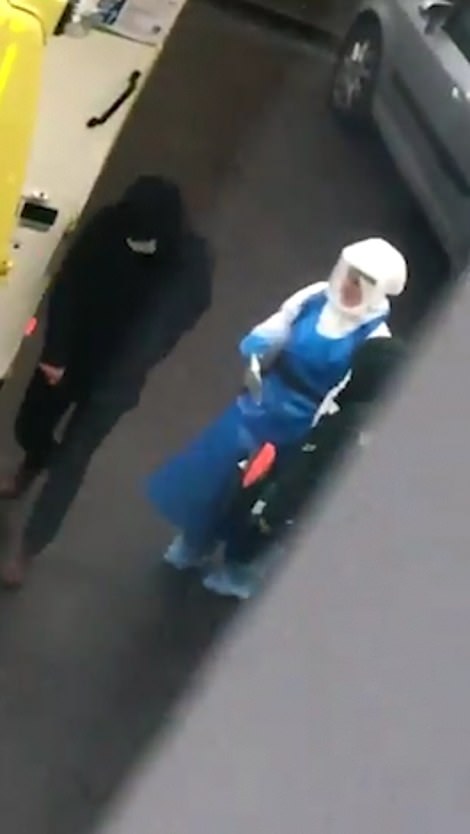
Two other paramedics wearing no protective clothing appear in the video – one appears from behind the ambulance doors (left) and another stands beside the hazmat-clad woman (right)
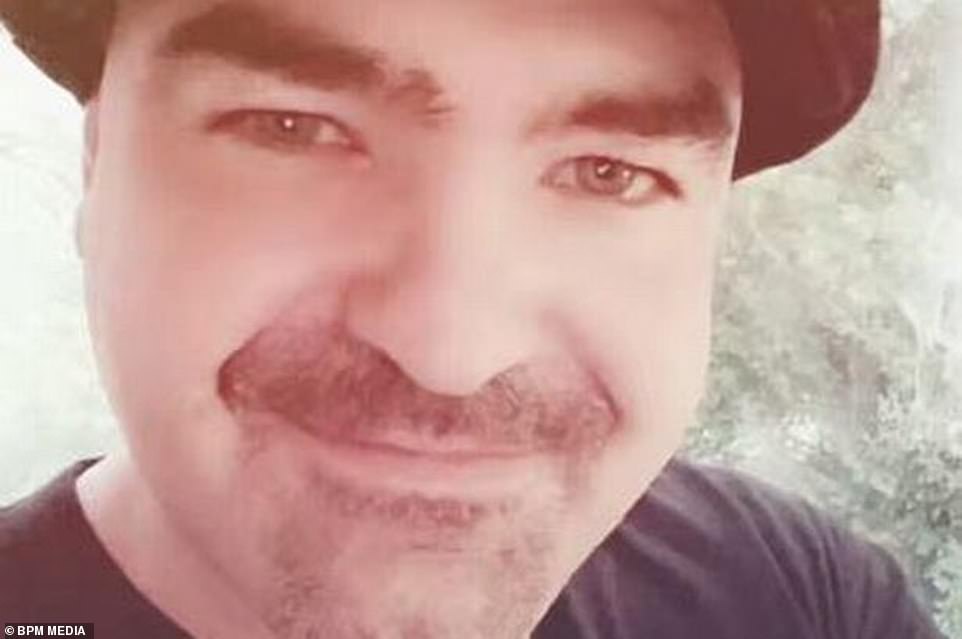
Mr Bennett travelled home from Wuhan – the outbreak’s epicentre – to Harborne, Birmingham, on New Year’s Eve and quickly became too unwell to leave his bed
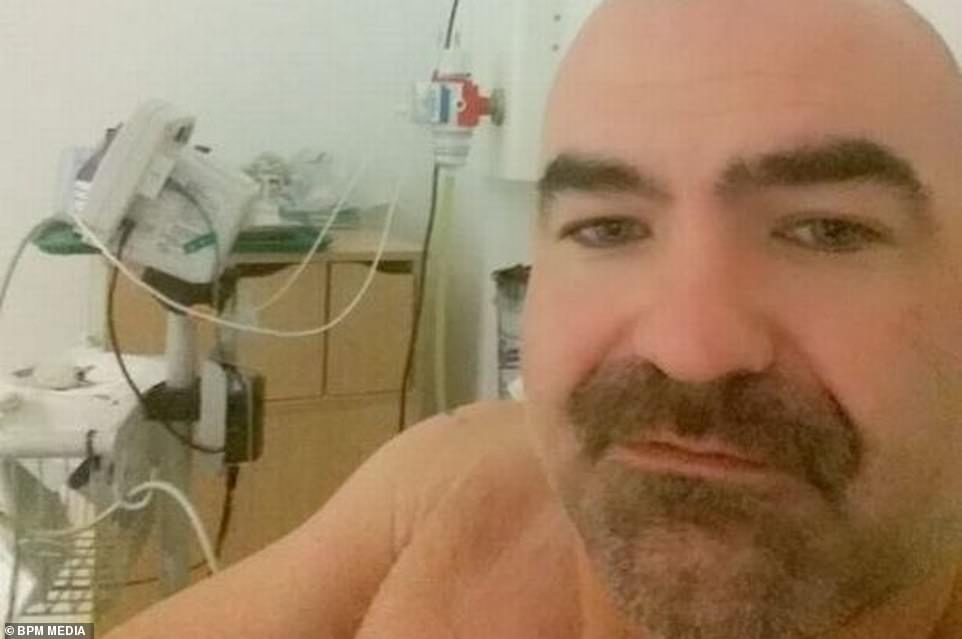
He is now in isolation at Queen Elizabeth Hospital where he is awaiting blood test results to see if he has the virus
The latest video comes despite Health Secretary Matt Hancock just yesterday warning around 2,000 Britons who are thought to have returned from Wuhan since the start of the outbreak to ‘self-isolate, stay indoors and avoid contact with other people’ in a significant ramping up of precautions.
Meanwhile in China, health workers have been hosing down streets, shops and public transport with disinfectant spray to try curb the spiralling epidemic.
Coronavirus has been deemed highly contagious and can spread via a simple cough or sneeze. It has killed more than 100 people in under a month.
West Midlands Ambulance Service has refused to answer any questions about why some staff were not wearing protective clothing while collecting Mr Bennett. A spokesman for the trust repeatedly told this website: ‘We can’t say a thing about the case.’
Speaking from his hospital bed, Mr Bennett told Birmingham Live: ‘Once I got back I was really ill with, what I thought, was a bad case of the flu. At that stage coronavirus hadn’t really been mentioned so I thought nothing of it.
‘However, when I went to the GP on Monday and he asked as a precaution if I had been to China, he seemed really concerned.
‘I was sent home and before I knew it, ambulances and people in hazmat suits had turned up. ‘I’m now in isolation at the QE [Queen Elizabeth] and just waiting to get my blood test results.’
Mr Bennett said he ‘did not feel particularly unwell’ now but admitted he has ‘not been 100 per cent’ since returning from China.
The salesman was sent home from his doctor practice on Monday despite admitting he was struck down with illness after visiting disease-ridden Wuhan last month.
But just last week Public Health England told doctors to lock patients in a room and leave straight away if they suspect they have coronavirus.
It reiterated that there were no confirmed cases of the virus in the UK. Nearly 100 people have now been tested for the virus, but all of them have come back as negative.
The extraordinary guidance read: ‘If [the Wuhan coronavirus] is considered possible when a consultation is already in progress, withdraw from the room, close the door and wash your hands thoroughly with soap and water.
‘Avoid physical examination of a suspected case. The patient should remain in the room with the door closed. Belongings and waste should remain in the room.
‘Advise others not to enter the room. If a clinical history still needs to be obtained or completed, do this by telephone.
‘The patient should not be allowed to use communal toilet facilities. Instruct them to not touch anything or anyone when walking to the toilet. Instruct the patient to wash their hands thoroughly after toileting.’
Christian Diaz, 32, who lives across the hallway from Mr Bennett’s flat, said he is now fearful for his own health after spending so long in close proximity to him.
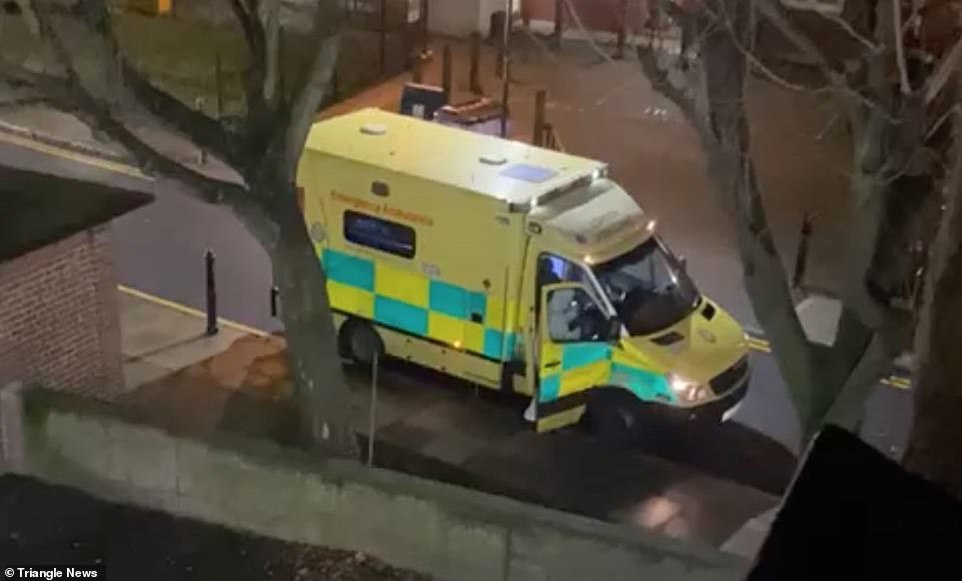
Separate footage taken in the early hours of Monday showed an ambulance worker in a white protective suit outside an address in Spitalfields, east London
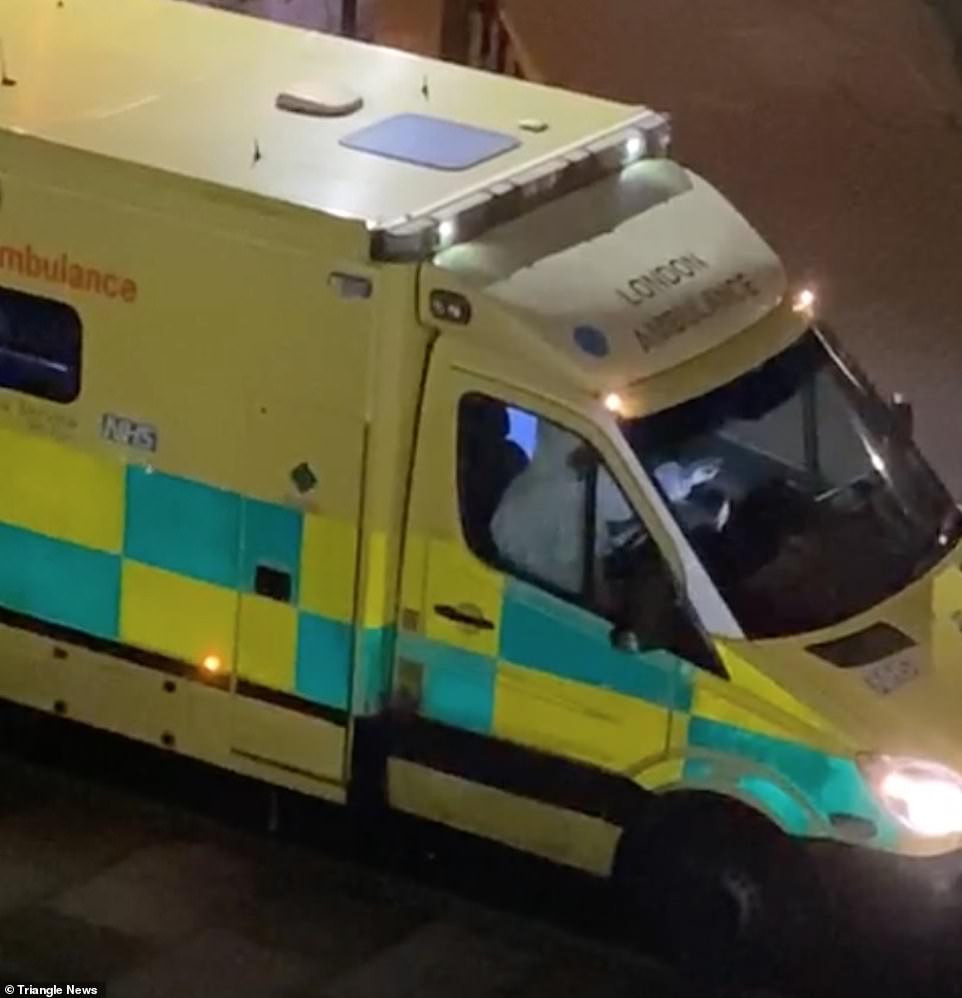
Details about the video are scarce and the London Ambulance Service Trust refused to comment
He added: ‘I was absolutely terrified when I looked out of my window and saw people walking around in Hazmat suits. It looked like something out of a movie.
‘An ambulance pulled up and then he was taken out wearing a mask. It seemed very serious. We are all very worried. Nobody has let us know what is going on.
‘We don’t know whether the building will be put into quarantine if it turns out that he does have the infection. Obviously, we hope that he is OK, but it’s concerning for everyone.’
Separate footage taken in the early hours of Monday showed an ambulance worker in a white protective suit outside an address in Spitalfields, east London.
Details about the video are scarce and the London Ambulance Service Trust refused to comment, saying the Department of Health (DoH) is dealing with the incident. The DoH said it would not speak on individual cases.
Wuhan coronavirus is now confirmed to have infected at least 4,500 people in 18 different countries around the world and killed 106 in China.
The US, Canada, Australia and France all confirmed cases last week while Germany, Sri Lanka and Cambodia yesterday became the latest countries to declare them overnight.
In a desperate attempt to prevent an outbreak on British soil, Mr Hancock begged travellers to stay indoors, avoid contact with anyone and ring NHS 111 if they have any symptoms.
Officials are still desperately trying to hunt down the 2,000 people who are in the UK after landing from Wuhan in the past fortnight.
Health chiefs revealed 73 people in the UK have already been tested for the never-before-seen virus – but all cases have so far come back as negative.
Public Health England admitted that the first UK confirmed case is likely to come from somebody already in the country.
Officials have not clarified exactly how patients will be taken to hospital if they complain of symptoms. But it is thought they will be taken in an ambulance and whisked straight off to be isolated while doctors run tests.
More than 2,000 people are thought to have jetted into Britain from Wuhan since cases first emerged last month. Mr Hancock’s advice applies to anyone who has entered Britain since January 10.
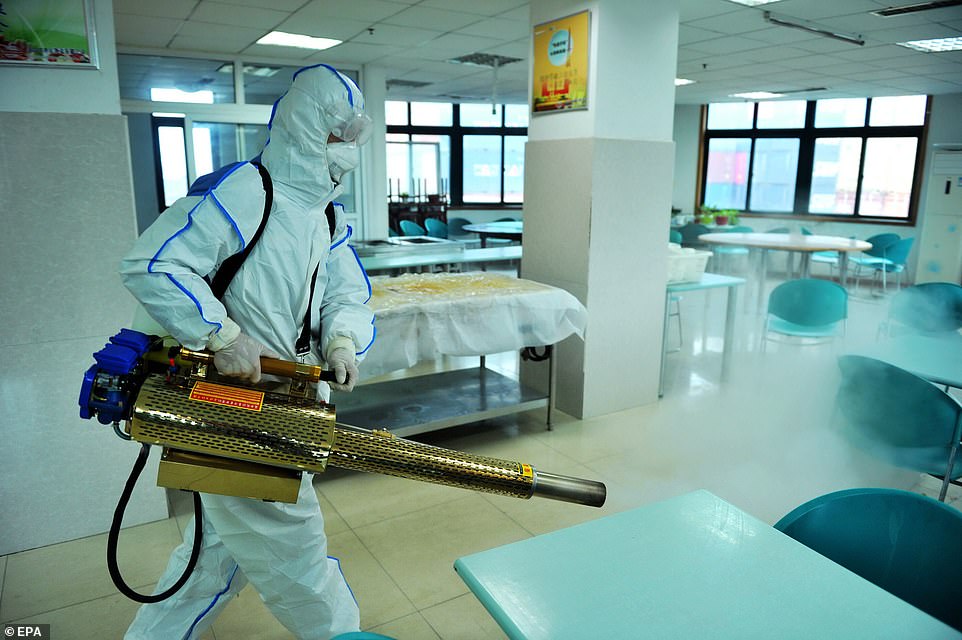
Meanwhile in China, health workers have been hosing down streets, shops and public transport with disinfectant spray to try curb the spiralling epidemic. Pictured: A worker sprays an office building in Qingdao, Shandong Province
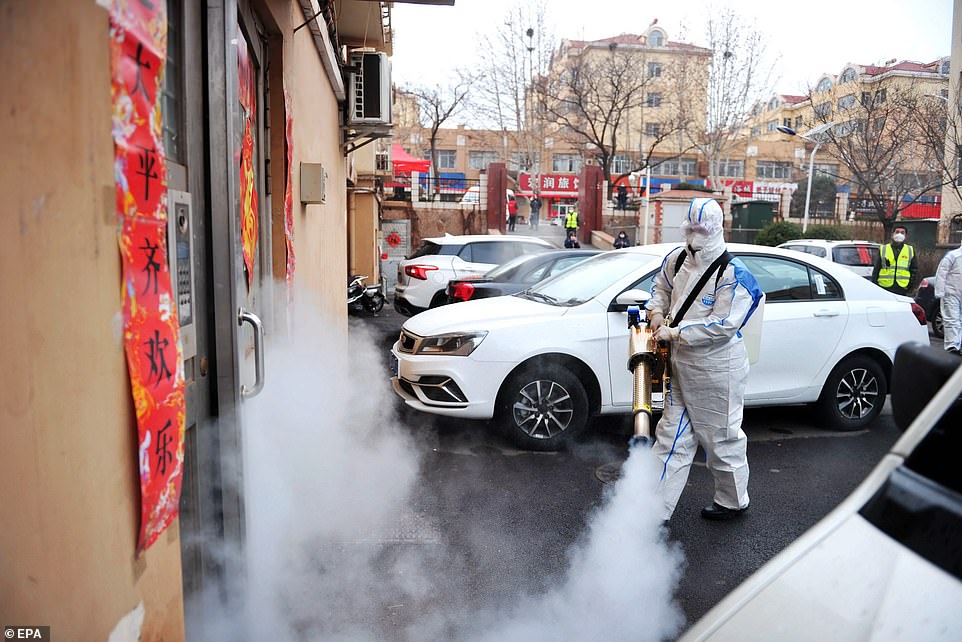
A volunteer sprays disinfectant in Qingdao’s residential West Coast area – Qingdao is a coastal city approximately 620miles (1,000km) away from Wuhan
Mr Hancock, who said there are four centres stood up and ready should there be a need – two in London, one in Liverpool and one in Newcastle, added: ‘Having eliminated those who we know have since left the country, there are 1,460 people we are seeking to locate.’
Meanwhile, hundreds of Britons trapped in the Chinese city at the heart of the coronavirus outbreak have been told to contact the embassy by 11am tomorrow if they want to come home. The Government is planning a landmark evacuation mission for Thursday.
The UK is still thrashing out the details with Chinese officials but a chartered flight is expected to pick them up from Wuhan airport and fly directly back to Britain.
Evacuees are likely to have health checks before they board any plane to the UK and they are expected to be held in quarantine for a fortnight when they return to stop the SARS-like infection – which has struck down more than 4,500 people and killed 106 – spreading on British soil.
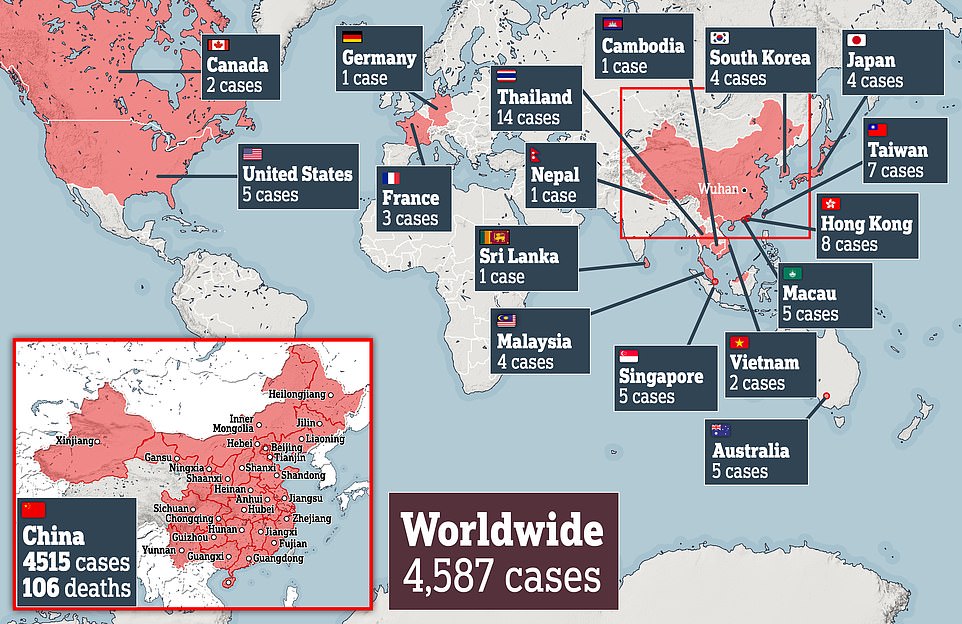
The killer coronavirus outbreak has now killed 106 people and struck down more than 4,500. Cases have been spotted in Canada, US, France and Australia
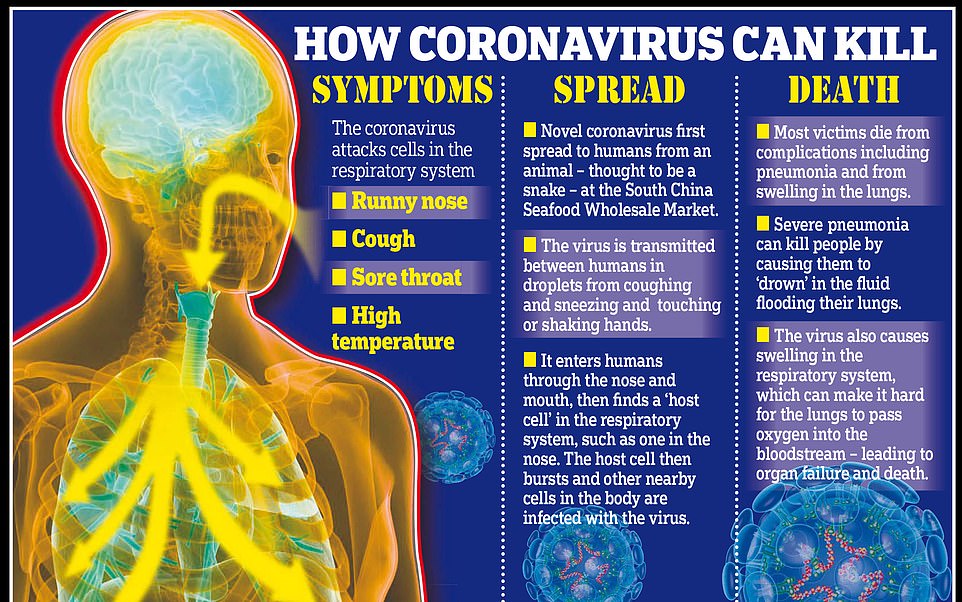
Experts say the difficulty of containing the coronavirus is that so many patients have mild, cold-like symptoms and don’t realise they have the infection
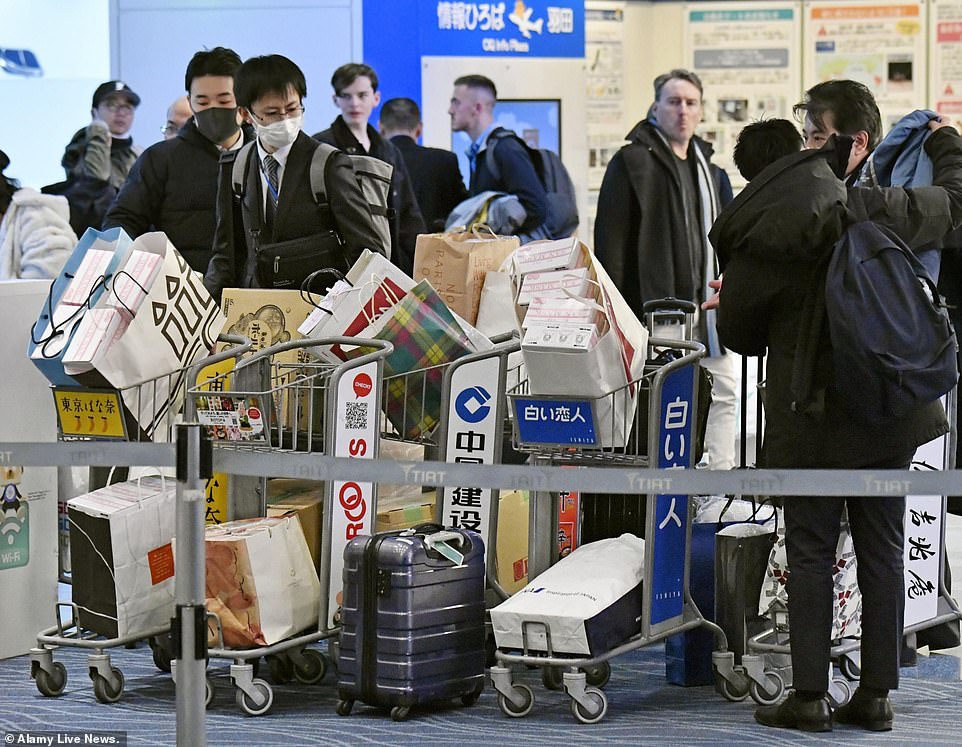
Japanese officials prepare to load various supplies such as face masks into a charter plane bound for Wuhan at Tokyo’s Haneda airport. The flight is to evacuate Japanese nationals from the Chinese city that has been hit by the outbreak of a new deadly coronavirus
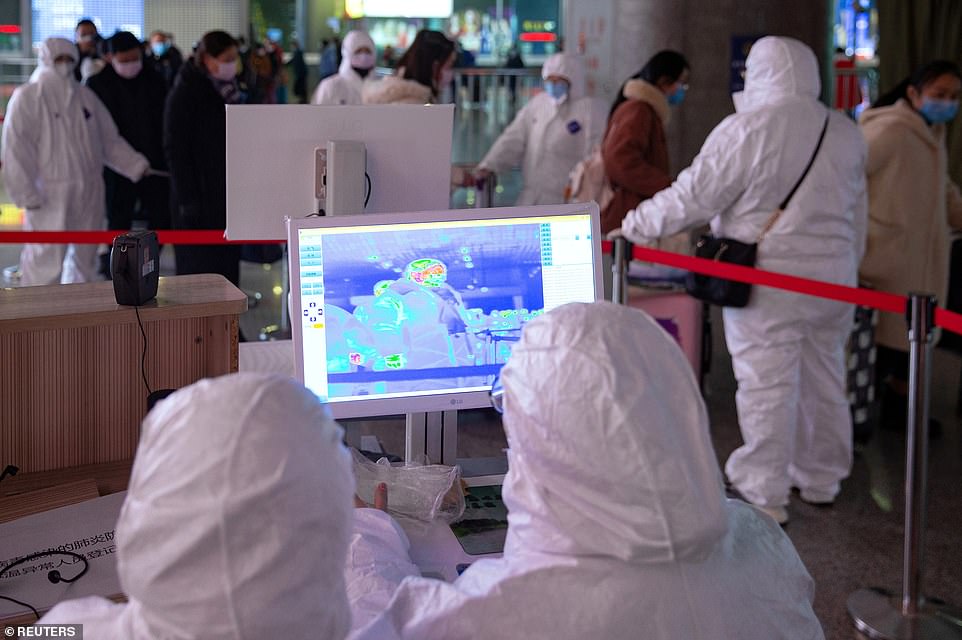
Passengers arriving at Nanjing Railway Station in China have their temperatures checked by staff who are looking to see if anyone has a high fever, a sign of infection
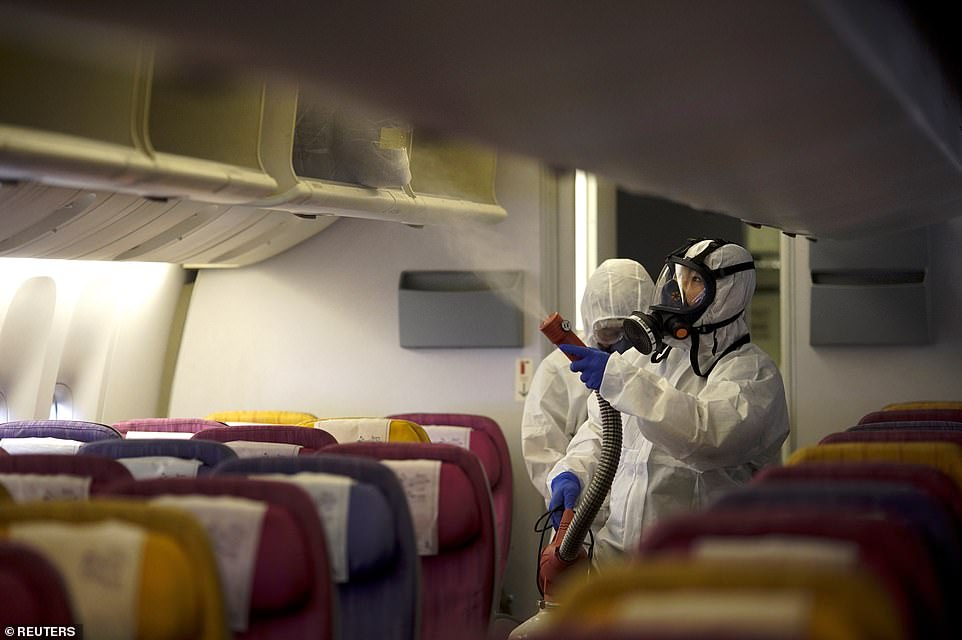
Thai Airways employees are pictured disinfecting an empty plane cabin at Suvarnabhumi International Airport in Bangkok today, January 28. Thailand has 14 confirmed coronavirus cases – the most outside of China
US officials announced a similar plan for its landmark evacuation flight this morning. Japan organised a Boeing 767 to fly out and rescue residents from Wuhan and the surrounding Hubei province, which has been battered by an onslaught of cases of the coronavirus.
Claims yesterday surfaced that China was blocking the emergency airlift operation, forcing Prime Minister Boris Johnson to insist the Government was doing ‘everything we can’.
Ex-pats stuck in Wuhan have already begged officials to ‘get us out of here’, with one furious Brit describing the situation as an ‘utter p***take’ and others accusing the Government – who revealed it was drawing up plans alongside the US and other international allies – of abandoning them.
The development came after British ministers were accused of dithering in their response to rescuing the estimated 300 ex-pats stranded in Wuhan.
A British teacher and his pregnant wife who are stuck in Wuhan begged for the Government to rescue them this afternoon.
In a desperate plea for help, Tom Williams published an open letter on Twitter letter – in which he explicitly states he is not telling his story to become famous.
The post has attracted hundreds of likes and retweets since it was posted on Twitter last night. His wife and son are both Canadian citizens.
He wrote: ‘Hello, my name is Tom Williams. I am a British expat teacher who has lived and worked in Wuhan, China for five year with Canadian wife of eight years (Lauren) and son, James (two).
‘My wife is currently 35 weeks pregnant and we are quarantined in the city. Local roads have been closed, which is making getting to the maternity hospital uncertain. The maternity hospital is also much closer to the initial area of the virus outbreak.
‘We are safe and have enough food. Local shops are still open and are well stocked. However, we are requesting that either the Canadian or British Government looks to help evacuate us.’
Mr Williams, from Cheltenham, added: ‘Advice from emergency consulate assistance in both Ottawa, and London, so far is that we should leave if we can. However, they have given no practical steps for how to do that.
‘Without diplomatic help, it would be almost impossible to leave. We are happy to be quarantined in Canada or the UK to guarantee the safety of citizens there, but I also want to ensure the safety of my wife, son and unborn child. If I have to stay behind so be it. My family is my number one priority.’
In his final paragraph, he added: ‘I am not messaging to try and become famous. I just want to try and share our story so I can try to get my wife, son and unborn child safely out of the city.
Other British citizens stuck in China publicly condemned the British government for being slow to react to the crisis.
Ian Thompson, a British-American dual national stranded in Wuhan, told Good Morning Britain that he would trapped if it hadn’t been for his dual citizenship because the UK had made no effort to contact or evacuate him.
He’ll be flown out of Wuhan on a California-bound chartered plane later today along with hundreds of Americans.
He is expected to be held in quarantine for a number of days when they land to stop the disease spreading on US soil.
As well as the US, Japan, South Korea, France and Spain have all announced similar rescue plans – but the dithering British government said it was still thrashing out options with Chinese officials to get the stranded ex-pats home ‘within the next few days’.
While it waits for a green-light to commence the repatriation, the Foreign Office has created a 24-hour helpline for anyone stuck in Hubei province – which is now entirely on lockdown as part of a desperate attempt to contain the SARS-like infection by trapping tens of millions of people.
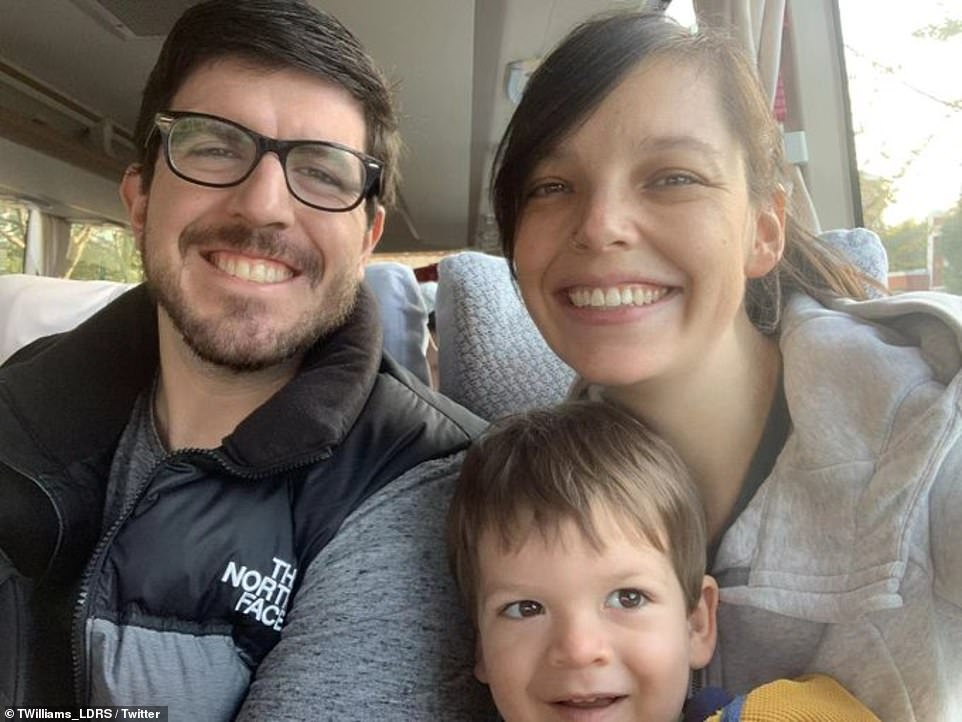
In a desperate plea for help, Tom Williams published on open letter on Twitter to say: ‘I just want to try and share our story so I can try and get my wife, son and unborn child safely out of the city (pictured with his wife Lauren and son James)
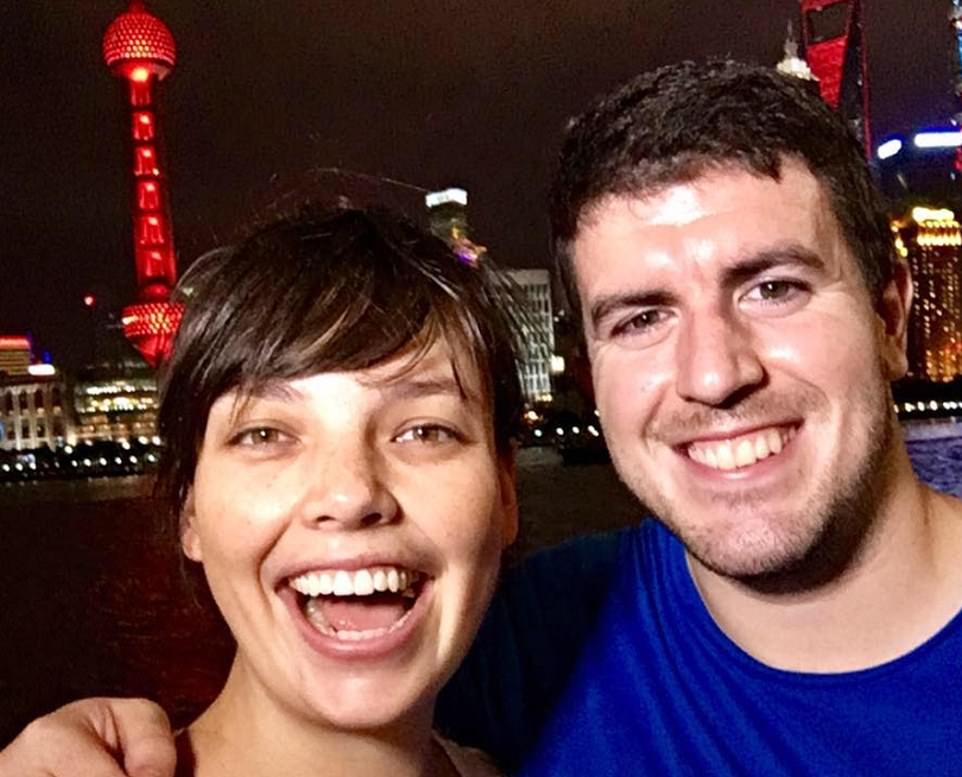
Mr Williams said: ‘Please read the letter below. Please help share our story. We are just an ordinary family seeking help!’ (pictured with his wife)
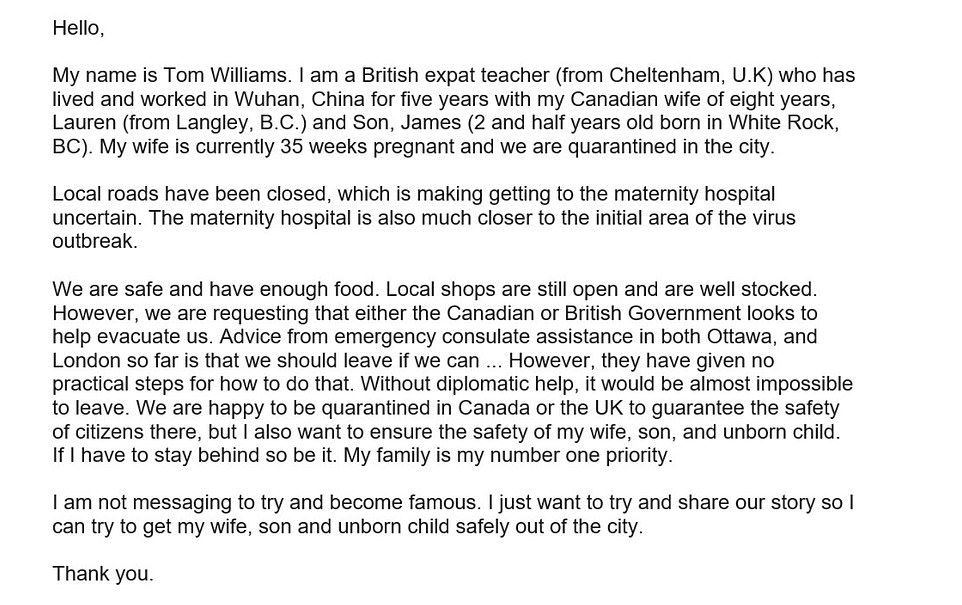
Mr Williams’s open letter – in which he explicitly states he is not telling his story to become famous – has attracted hundreds of likes and retweets since it was posted on Twitter last night. His wife and son are both Canadian citizens
Graham Hubbard, 38, is one of a group of three British scientists confined to their hotel rooms in Wuhan. He said the Foreign Office’s advice had been ‘confusing’ and came too late for them to plan their own escape.
The scientist, from Wantage, Oxfordshire, was on a working trip with colleagues when the Chinese authorities blocked transport in and out of Wuhan.
His scheduled return flight home was due to take off an hour and a half after the city-wide quarantine came into force last Thursday.
Mr Hubbard and his colleagues, Richard Staunton-Lambert, 49, also from Wantage, and Victoria Sullivan, from Bracknell, Berkshire, are staying at the five-star Renaissance hotel.
He told The Times: ‘We are trapped in our hotel rooms, surrounded by a ghost town with no idea when we can go home to our families and no practical help from our own government, who are giving us contradictory advice.’
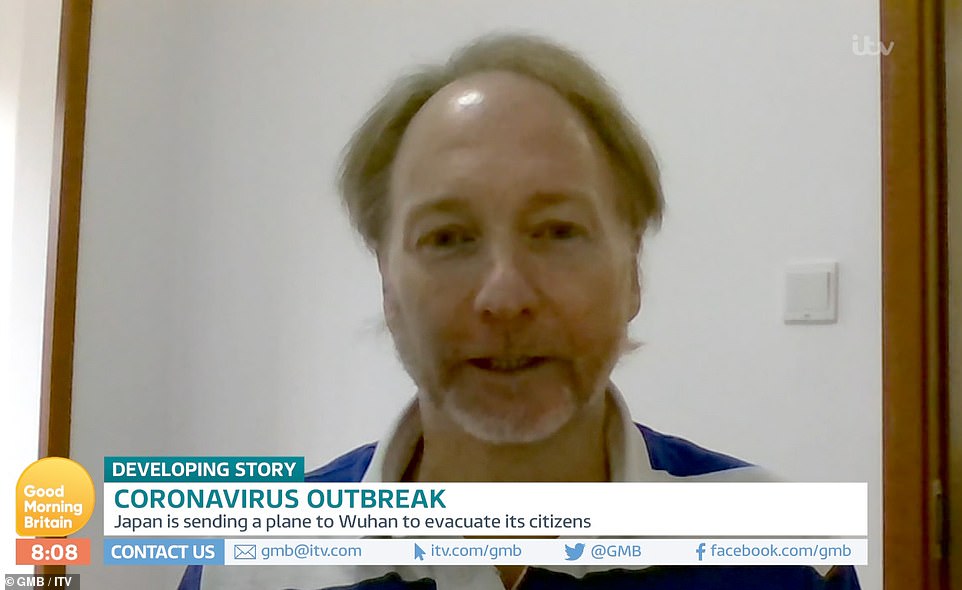
Dual national Ian Thompson told Good Morning Britain that he would ‘stuck here’ if it hadn’t been for his US nationality, saying he is not aware of any attempts by the UK to lift some 300 British ex-pats stranded in Wuhan, described it as a ‘ghost town’ for its empty streets
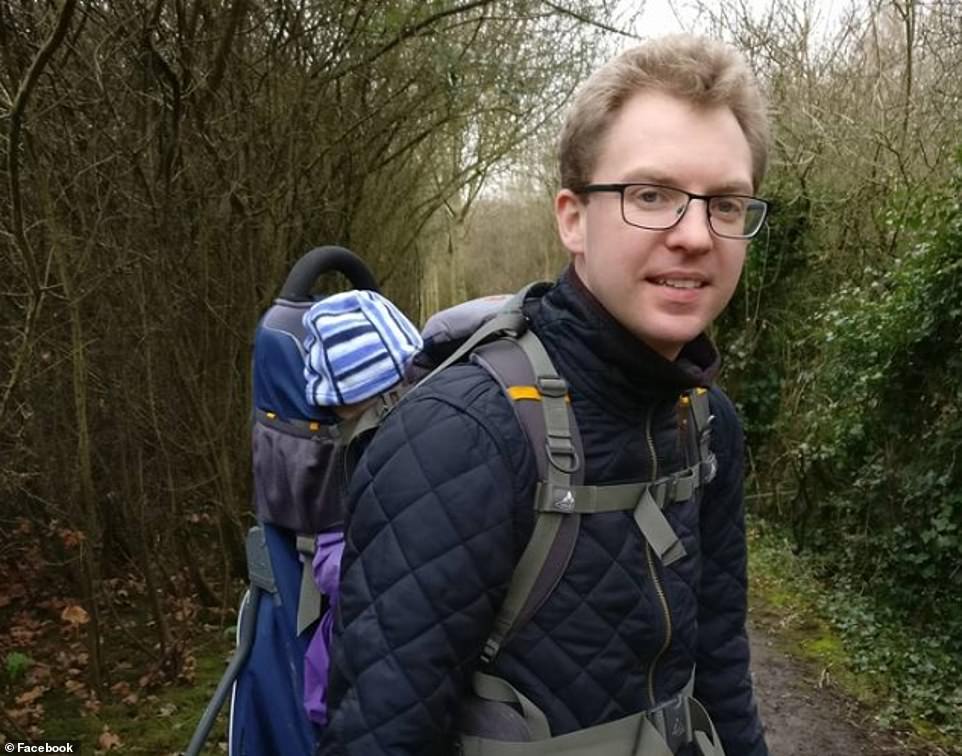
Graham Hubbard is one of a group of three British scientists confined to their hotel rooms in Wuhan. He blasted the Foreign Office for its ‘confusing’ advice, which came too late for them to plan their own escape
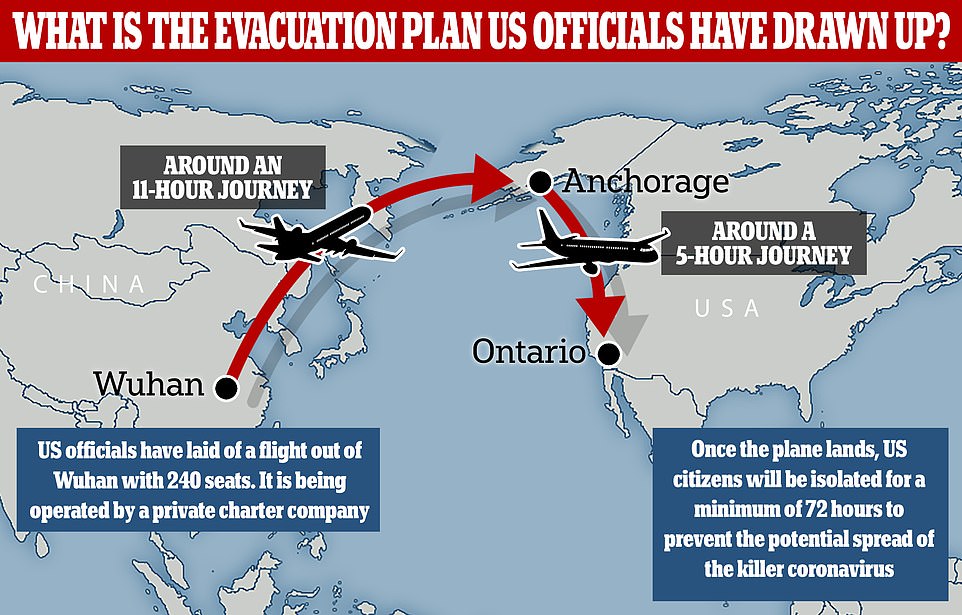
The US is sending a chartered plane to Wuhan to take Americans stranded in the coronavirus-hit city to Alaska, before another plane diverts them to Ontario City in California
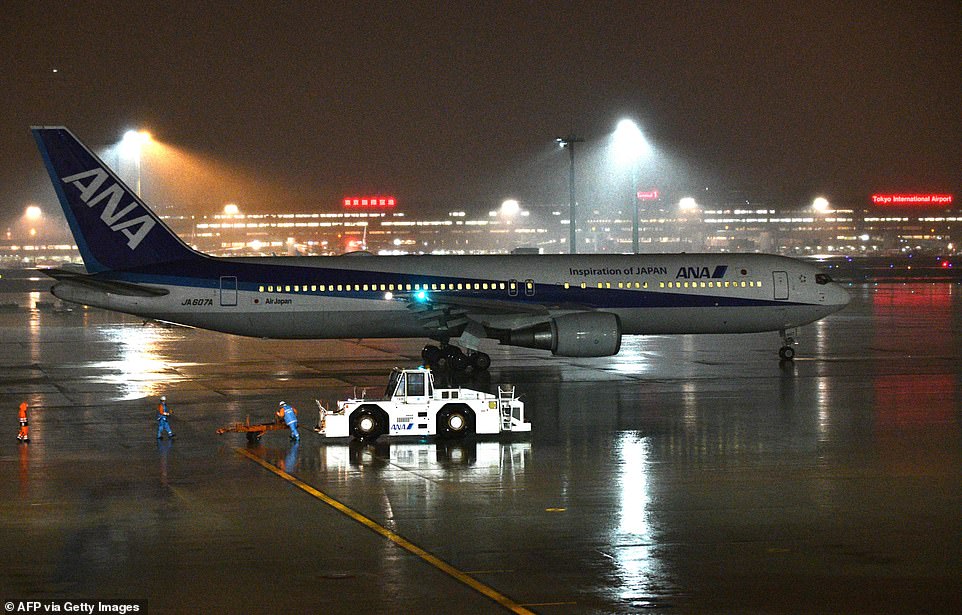
A charter plane organised by the Japanese government to evacuate nationals from Wuhan. It is pictured leaving Tokyo’s Haneda International Airport passenger terminal this evening
The initial advice from the Foreign Office was to stay put and not leave the city until after the travel ban was lifted. But at that time UK officials were not aware of the scale of the outbreak, Mr Hubbard said.
He added: ‘By then it was too late for us to do anything, the flights and trains were cancelled and we were trapped.
‘When I spoke with the Foreign Office today I was told ‘we can not guarantee anything’. It is very frustrating because we have been given contradictory advice.
‘The Foreign Office website was finally updated at 9am UK time. So nothing happens all weekend until they get back to work on Monday.’
Mr Hubbard had been woken up by his panicked wife at the crack of dawn last Thursday who told him about the travel restrictions.
He tried to catch the high-speed train to a city three hours away to fly via a different airport, but was refused a ticket.
The father then hired a taxi but the roads were so congested that by the time he got to the outskirts of the city roadblocks had been put up.
Bosses in Wuhan have banned the use of cars, meaning the motorways and streets are eerily quiet. The hotel where the British scientists are staying have banned communal eating in the dining room because of the increasing risk of new infections.
Guests can collect takeaway meals to eat in their own rooms or order room service. Mr Hubbard’s wife Laura, 39, who is at home with their three children aged four, six and eight, had begged for the British government to help.
Transport Secretary Grant Shapps this morning said the Government is ‘working on’ how to bring people home from the Chinese city. He told BBC Breakfast: ‘For anybody who is there, one of the issues we have, working with our partners internationally on this, is actually identifying how many British citizens there are in Wuhan.
‘One of the things we’re asking people to do is to contact the consulate there to make them aware. People have started to do that. ‘We are working on arrangements as well.’
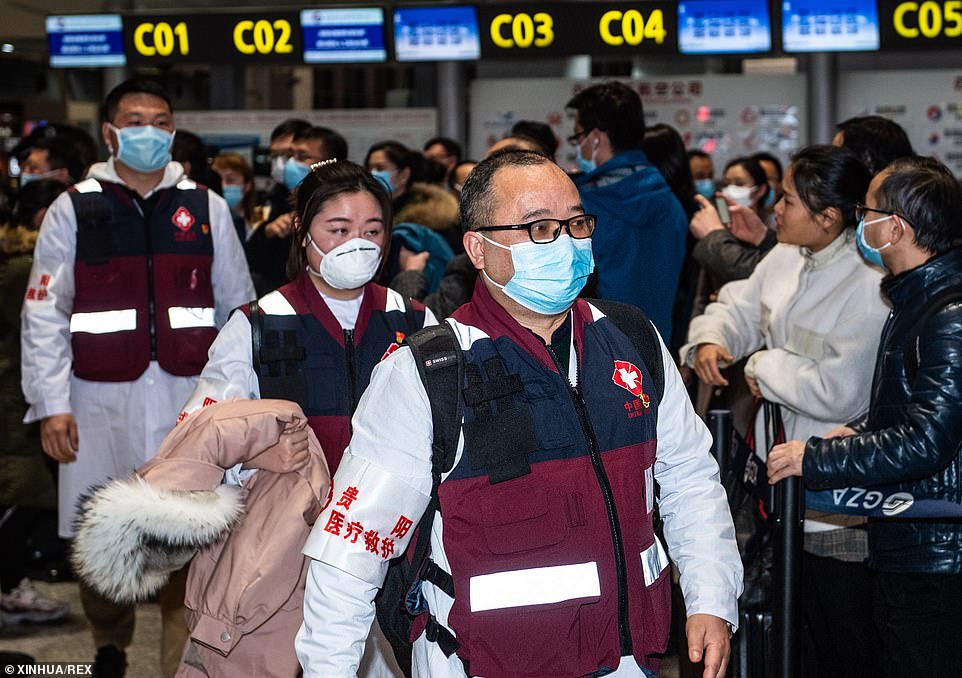
Medical workers in Guiyang, Guizhou, prepare to head into Wuhan to help with the response to the coronavirus outbreak
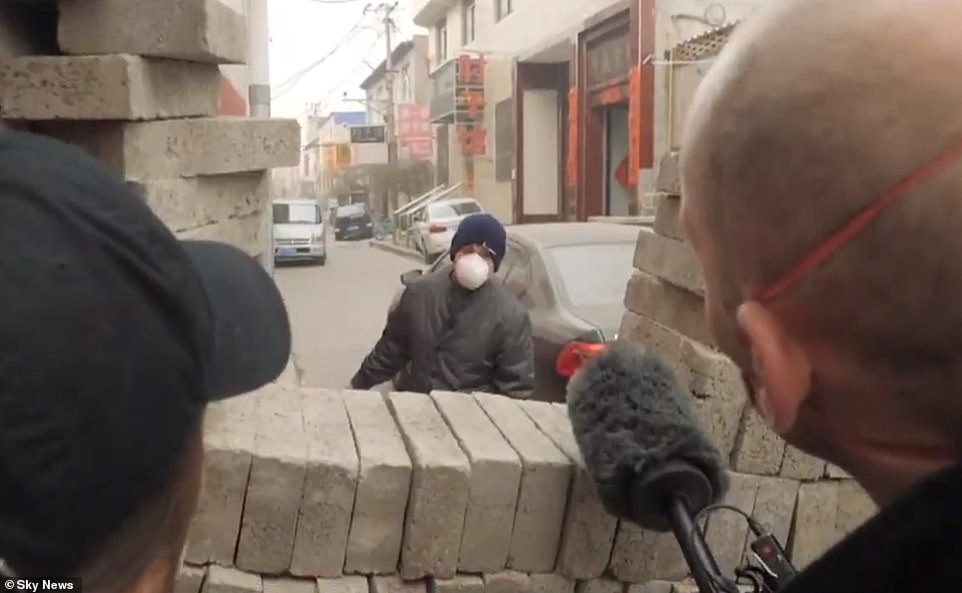
Six villages in Hebei – the province surrounding the capital Beijing, where dozens of cases have been confirmed – have taken matters into their own hands and are building brick walls around their street to protect it, Sky News reports
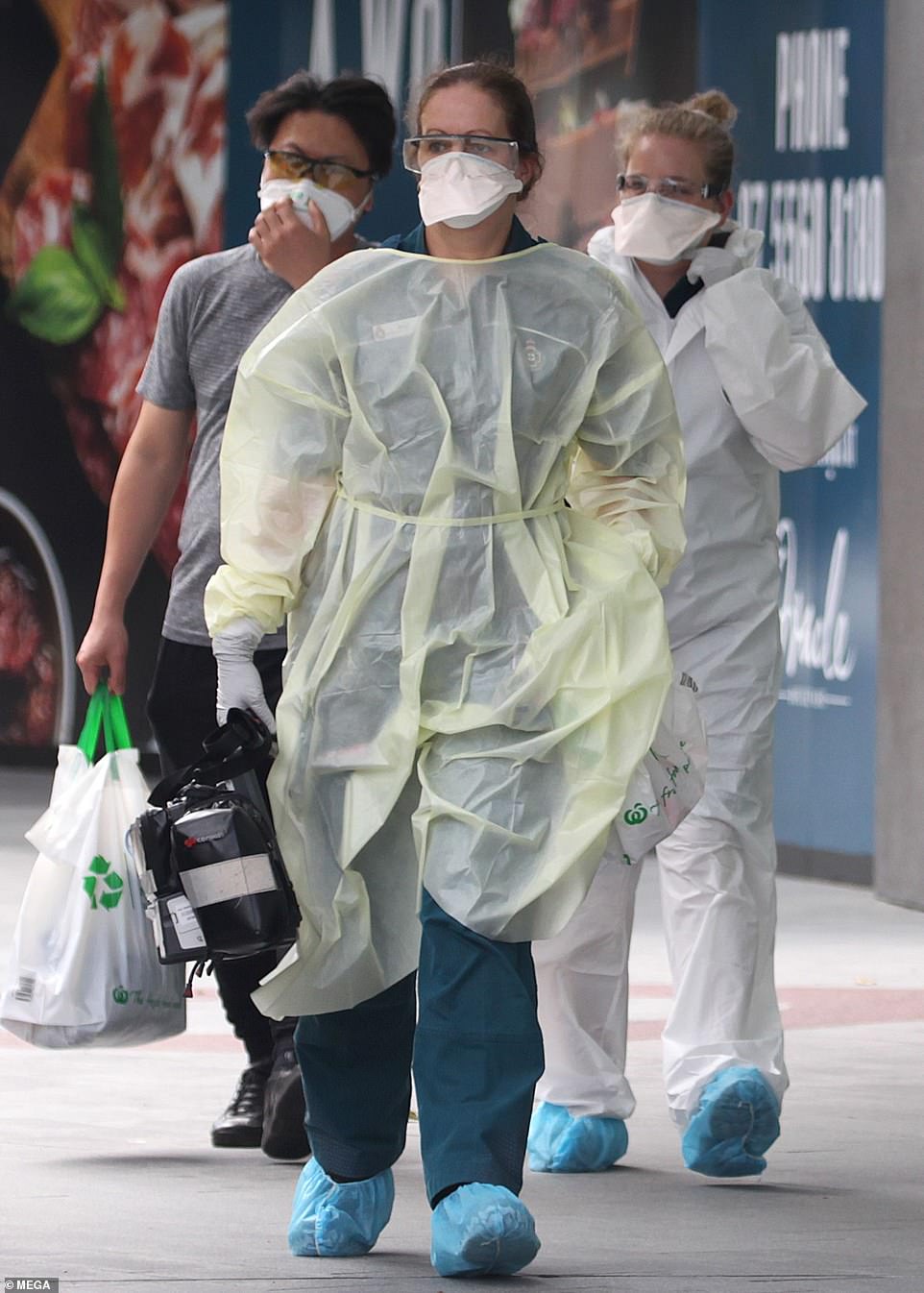
Paramedics wearing hazmat suits arrived in Broadbeach, Australia, to reports of a suspected coronavirus case on Tuesday – they are pictured escorting the male patient out to an ambulance
He added: ‘If they actually contact the consulate where they are then that consulate is in fact gathering together all the information of the people who are there, in order to help repatriate where that’s appropriate.’
It comes after the Chinese partners of US citizens were been banned from a rescue flight to evacuate Americans from Wuhan. A charter flight is scheduled to fly from the Wuhan Tianhe International Airport to Alaska before landing in Ontario, California, where all of the evacuees will be quarantined for at least 72 hours.
In other developments in the escalating crisis today, A German man has become the first person in Europe to catch the virus without even going to China.
The unidentified 33-year-old caught the disease in his home country on January 21 from a colleague visiting from China and later became ill on her flight home.
She was from Shanghai but had recently visited her parents in Wuhan, according to reports.
The German man’s case is one of four – men in Vietnam, Japan and Taiwan have also been infected at home.
Countries around the world are starting to cut ties with China and pull their citizens out of the crisis-hit Hubei region, where the virus emerged in the city of Wuhan.
Hong Kong’s leader today held a press conference during which she wore a face mask and said the city would stop all high-speed trains and ferries to the mainland.
In a dramatic intervention, she also announced Hong Kong would halve the number of flights and stop giving visas to visitors from China.
And a health minister in Thailand today admitted that the country is ‘not able to stop’ the spread of the virus there, where 14 people have been infected.
But China is maintaining a solid front – President Xi Jinping today said the nation would ‘win the battle against the devil virus’.
And a Chinese scientist said he thinks the outbreak and the ‘battle of Wuhan’ will peak in 10 days’ time.
